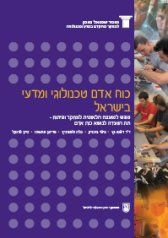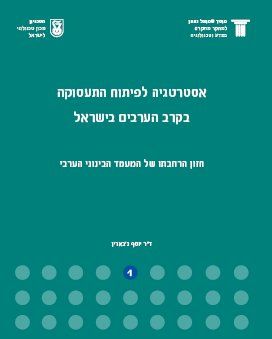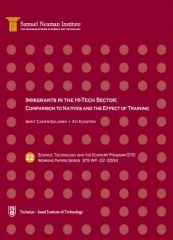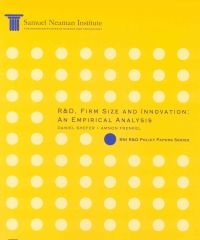Human Resources for Science and Technology in Israel – Selected Topics (Part A)
The economic strength of any modern country is based on its ability to translate scientific knowledge and technological innovation to new products and services. This is especially relevant in the case of Israel which lacks natural resources. The basis for creating a scientific and technological knowledge base lies in the cultivation of human capital. The […]
Human Resources for Science and Technology in Israel

A prosperous economy and high quality of life require technological innovation. This is especially relevant in the case of Israel which lacks natural resources. The foundation for creating a scientific and technological knowledge basis lies in the development of a human capital. The European Union estimates that by the year 2010 it will need some […]
A Strategy for Developing Employment Opportunities for the Arabs in Israel: The Vision for Expanding the Arab Middle Class

This study analyzes the problems that face the Arab community in Israel in the field of work and employment. It presents a strategy for developing employment opportunities for the Arab minority in Israel. Moreover, the study suggests a new vision for expanding the Arab middle class in Israel by developing equal employment opportunities.
Innovation Policy for Development: an Overview STE-WP-34
This paper provides a framework for thinking about innovation policies for development. In such context innovation should be construed as a very broad notion that includes product and in process innovations of various sorts, generated by rank and file workers as much as by R&D labs. The economic rationale for government support of R&D needs […]
The Society and National Security
השקעות במו”פ אזרחי, הון אנושי ותפוקה מדעית-טכנולוגית של מו”פ בישראל: נתונים כבסיס לדיון לגיבוש מדיניות לאומית
Immigrants in the Hi-Tech Sector: Comparison to Natives and the Effect of Training STE-WP-22-2004

This paper provides a descriptive analysis of the integration of the immigrants from the CIS in the Israeli labor market and, specifically, in the hi-tech sector. The analysis is based on the national cross sectional Labor Force Survey and on a unique panel data that follows Russian engineers for up to twelve years in Israel. […]
R&D, Firm Size and Innovation: An Empirical Analysis, SNI R&D Policy Papers Series

Investment in R&D spawns innovations, which in turn foster economic growth. In recent years, researchers have become increasingly aware of the role of industrial innovation in the rate of regional development and economic growth. In order to innovate, firms must invest in R&D (in-house or out-sourcing), and engage highly skilled labor that is able to […]
Trends in Hiring Demands for Professionals by Companies Belonging to the Association of Software Developers in Israel

We are lately witnessing a gap between demand and supply for professionals which might hamper further development of industry. The professional training provided to new immigrants until now did, indeed, supply a considerable number of professionals to industry; this however, is not enough to answer the ever growing demand for more, on the one hand, […]
Seminar: Training and Qualifying Teachers in Science and Mathematics

Report on the activity of the project “Scientific and technological education towards the 2000s” Prof. Gad Elam, Faculty of Physics, Technion I would briefly define the purpose of the research as the formulation of science education policy. Research was conducted by a team of the Technion in collaboration with people from other institutions, where members […]
